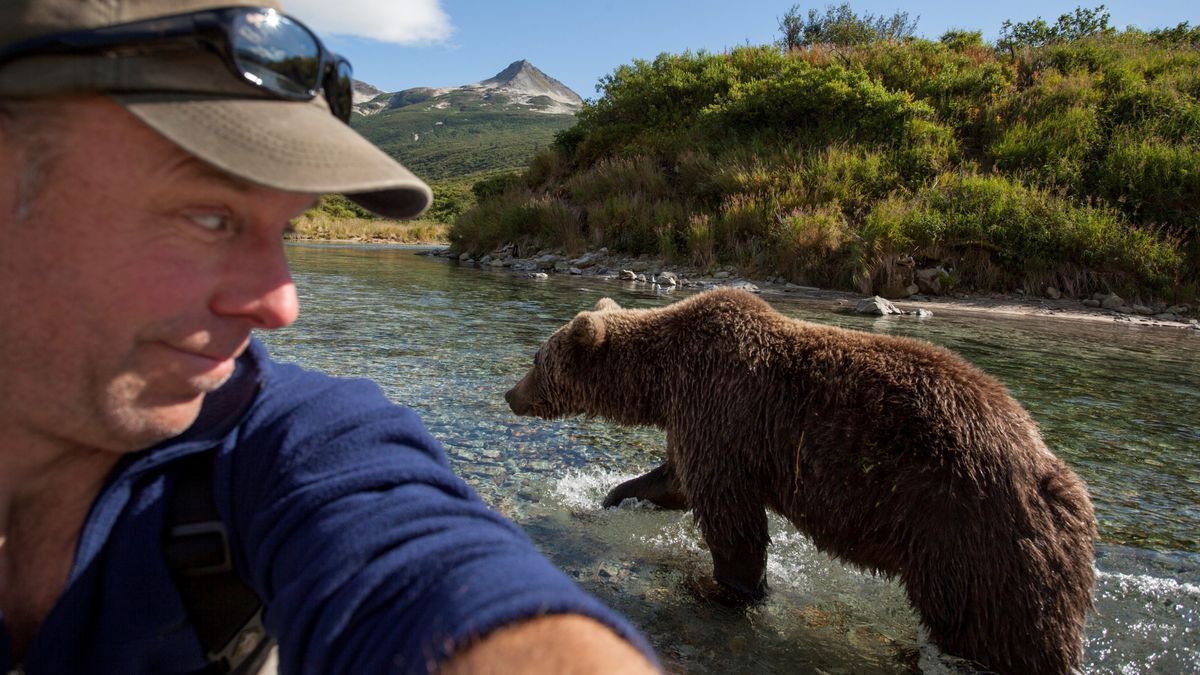
"They are more afraid of you than you are of them" is a saying that is often used to reassure hikers that even large predators, such as bears and pumas, pose little threat to us. But humans are slower and weaker than these animals, so what stops these beasts from snacking on every clothed ape they come across?
There are a few likely reasons why they don't attack more often. Looking at our physiology, humans evolved to be bipedal — going from moving with all four limbs to walking upright on longer legs, according to John Hawks, a paleoanthropologist at the University of Wisconsin-Madison.
"There is a threat level that comes from being bipedal," Hawks told Live Science. "And when we look at other primates — chimpanzees, gorillas, for instance — they stand to express threats. Becoming larger in appearance is threatening, and that is a really easy way of communicating to predators that you are trouble."
Related: How many early human species existed on Earth?
Bipedalism may make humans appear bigger and therefore more threatening to other species, but it also has disadvantages. It is typically slower to move on two legs than on four, meaning humans have abandoned any pretext of outrunning any four-legged creature, according to Hawks.
"It's sort of like a bluff," Hawks said. "It's like, 'I'm walking around; I'm tough; I'm showing where I am on a landscape.'" Predators see the upright stance and assume humans are tougher than we actually are, according to Hawks. However, even if they were to call our bipedal bluff, predators have other reasons to leave us alone.
Larger primates, such as humans and chimps, live in groups and adopted the strategy of aggressively defending themselves against threats, which usually works against predators, Hawks said. Being social has therefore helped keep us safe, along with the benefits of bipedalism.
As human technology advanced, we developed an arsenal of advanced weapons, such as bows and guns, that could be used from a distance. With these weapons, humans became so deadly that they began taking the fight to predators.
Another reason humans are rarely attacked by large wild animals is that their numbers have declined. "We've been trying to essentially clear the landscape that we use of large predators for a very long time," Justin Suraci, lead scientist in community ecology and conservation biology at Conservation Science Partners, a nonprofit conservation science organization based in California, told Live Science.
Large predators and their habitats suffered great losses in the United States before and into the 20th century, before the passing of the Endangered Species Act of 1973, Suraci noted. For example, humans hunted, trapped and poisoned wolves (Canis lupus) to near extinction, Live Science previously reported, and pumas (Puma concolor) were wiped out of the entire eastern half of North America, except for a small population in Florida, according to the International Union for Conservation of Nature.
Related: What's the first species humans drove to extinction?
Predators living in other areas that are heavily populated by humans have faced similar problems. According to Suraci, the animals that have escaped human menace likely learned to become weary of our species. "For very logical reasons, some of these larger predators have a healthy fear of humans in the same way that any prey species would fear its predators," Suraci said.
In a 2019 study published in the journal Ecology Letters, Suraci and his colleagues played recordings of human voices through remote speakers in the Santa Cruz Mountains of California. The study showed that the sound of humans talking was enough to scare away pumas and several smaller predators, such as bobcats (Lynx rufus).
The recordings were designed to simulate benign conversation and consisted mostly of Suraci and his friends reciting poetry and passages from books. The effect was so strong, the recordings had a similar effect to removing predators from an ecosystem altogether, with reduced predator activity allowing small, would-be prey animals, like mice, to forage more than they normally would.
Suraci thinks this fear that predators have of humans could also have an upside: It could help prevent conflict between humans and wildlife. Large predators need a lot of space, and in a human-dominated world, they need to be able to live alongside humans without conflict.
"The fear of humans that a lot of these predators show is really positive in that light," Suraci said. "It gives us some opportunity to potentially share spaces with these animals — to go hiking in places where pumas, bears and wolves all exist, without experiencing any negative impacts."
Put another way, wild predators' "healthy fear" of humans may help us coexist, "as long as we're conscious about their presence," Suraci said. Indeed, it's important to be smart while hiking in regions where large predators live. For instance, in bear country, people should hike in groups and periodically yell "Hey bear," to give animals time to leave the vicinity before an encounter, Live Science previously reported.
Originally published on Live Science.
Article From & Read More ( Humans are practically defenseless. Why don't wild animals attack us more? - Livescience.com )https://ift.tt/3wwS4tj
Science
No comments:
Post a Comment